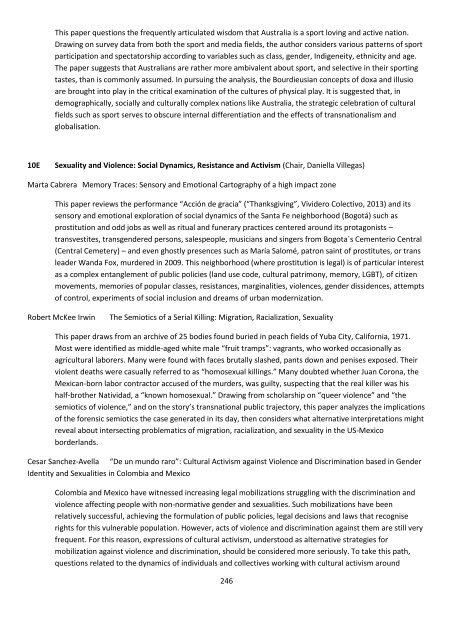Crossroads in Cultural Studies Conference 14-17th December 2016 Program Index
Crossroads-2016-final-draft-program-30-Nov
Crossroads-2016-final-draft-program-30-Nov
Create successful ePaper yourself
Turn your PDF publications into a flip-book with our unique Google optimized e-Paper software.
This paper questions the frequently articulated wisdom that Australia is a sport lov<strong>in</strong>g and active nation.<br />
Draw<strong>in</strong>g on survey data from both the sport and media fields, the author considers various patterns of sport<br />
participation and spectatorship accord<strong>in</strong>g to variables such as class, gender, Indigeneity, ethnicity and age.<br />
The paper suggests that Australians are rather more ambivalent about sport, and selective <strong>in</strong> their sport<strong>in</strong>g<br />
tastes, than is commonly assumed. In pursu<strong>in</strong>g the analysis, the Bourdieusian concepts of doxa and illusio<br />
are brought <strong>in</strong>to play <strong>in</strong> the critical exam<strong>in</strong>ation of the cultures of physical play. It is suggested that, <strong>in</strong><br />
demographically, socially and culturally complex nations like Australia, the strategic celebration of cultural<br />
fields such as sport serves to obscure <strong>in</strong>ternal differentiation and the effects of transnationalism and<br />
globalisation.<br />
10E<br />
Sexuality and Violence: Social Dynamics, Resistance and Activism (Chair, Daniella Villegas)<br />
Marta Cabrera Memory Traces: Sensory and Emotional Cartography of a high impact zone<br />
This paper reviews the performance “Acción de gracia” (“Thanksgiv<strong>in</strong>g”, Vividero Colectivo, 2013) and its<br />
sensory and emotional exploration of social dynamics of the Santa Fe neighborhood (Bogotá) such as<br />
prostitution and odd jobs as well as ritual and funerary practices centered around its protagonists –<br />
transvestites, transgendered persons, salespeople, musicians and s<strong>in</strong>gers from Bogota´s Cementerio Central<br />
(Central Cemetery) – and even ghostly presences such as María Salomé, patron sa<strong>in</strong>t of prostitutes, or trans<br />
leader Wanda Fox, murdered <strong>in</strong> 2009. This neighborhood (where prostitution is legal) is of particular <strong>in</strong>terest<br />
as a complex entanglement of public policies (land use code, cultural patrimony, memory, LGBT), of citizen<br />
movements, memories of popular classes, resistances, marg<strong>in</strong>alities, violences, gender dissidences, attempts<br />
of control, experiments of social <strong>in</strong>clusion and dreams of urban modernization.<br />
Robert McKee Irw<strong>in</strong><br />
The Semiotics of a Serial Kill<strong>in</strong>g: Migration, Racialization, Sexuality<br />
This paper draws from an archive of 25 bodies found buried <strong>in</strong> peach fields of Yuba City, California, 1971.<br />
Most were identified as middle-aged white male “fruit tramps”: vagrants, who worked occasionally as<br />
agricultural laborers. Many were found with faces brutally slashed, pants down and penises exposed. Their<br />
violent deaths were casually referred to as “homosexual kill<strong>in</strong>gs.” Many doubted whether Juan Corona, the<br />
Mexican-born labor contractor accused of the murders, was guilty, suspect<strong>in</strong>g that the real killer was his<br />
half-brother Natividad, a “known homosexual.” Draw<strong>in</strong>g from scholarship on “queer violence” and “the<br />
semiotics of violence,” and on the story’s transnational public trajectory, this paper analyzes the implications<br />
of the forensic semiotics the case generated <strong>in</strong> its day, then considers what alternative <strong>in</strong>terpretations might<br />
reveal about <strong>in</strong>tersect<strong>in</strong>g problematics of migration, racialization, and sexuality <strong>in</strong> the US-Mexico<br />
borderlands.<br />
Cesar Sanchez-Avella “De un mundo raro”: <strong>Cultural</strong> Activism aga<strong>in</strong>st Violence and Discrim<strong>in</strong>ation based <strong>in</strong> Gender<br />
Identity and Sexualities <strong>in</strong> Colombia and Mexico<br />
Colombia and Mexico have witnessed <strong>in</strong>creas<strong>in</strong>g legal mobilizations struggl<strong>in</strong>g with the discrim<strong>in</strong>ation and<br />
violence affect<strong>in</strong>g people with non-normative gender and sexualities. Such mobilizations have been<br />
relatively successful, achiev<strong>in</strong>g the formulation of public policies, legal decisions and laws that recognise<br />
rights for this vulnerable population. However, acts of violence and discrim<strong>in</strong>ation aga<strong>in</strong>st them are still very<br />
frequent. For this reason, expressions of cultural activism, understood as alternative strategies for<br />
mobilization aga<strong>in</strong>st violence and discrim<strong>in</strong>ation, should be considered more seriously. To take this path,<br />
questions related to the dynamics of <strong>in</strong>dividuals and collectives work<strong>in</strong>g with cultural activism around<br />
246


